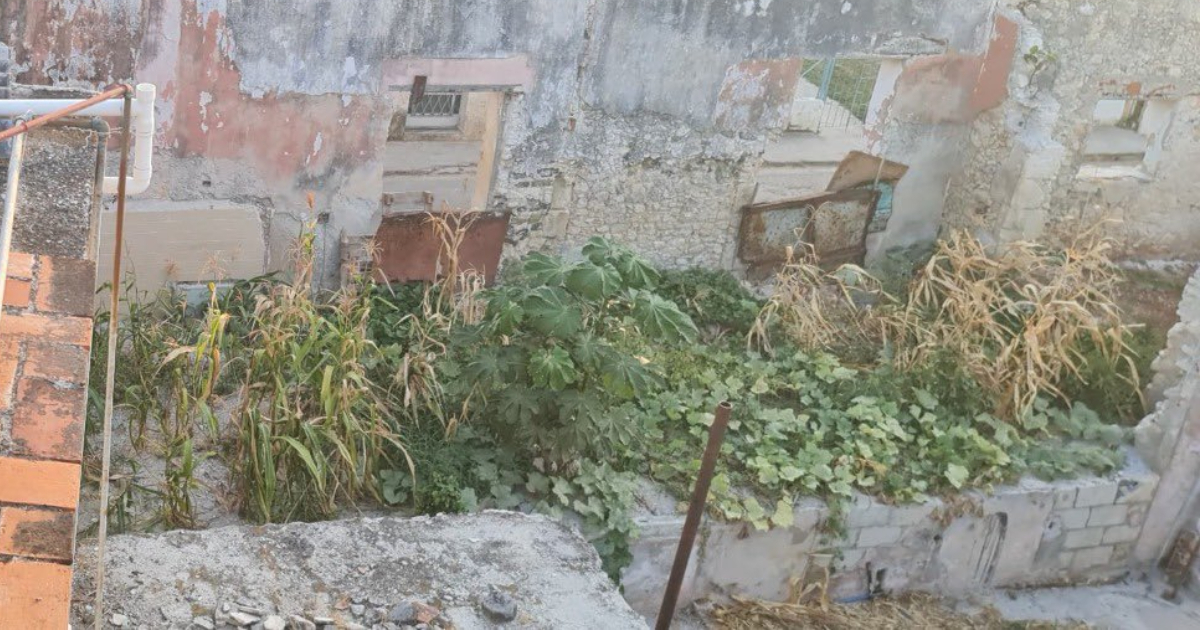
He believed in the propaganda of the Castro regime "Cultivate your little piece" and it cost him dearly. An elderly Cuban has been fined for growing corn on an abandoned plot within an abandoned school on the Island. This is reported on the social network X (formerly Twitter) by the NGO Food Monitor Program, dedicated to investigating the socioeconomic impact of food policies in authoritarian contexts.
According to the account from the non-governmental organization, which aims to demonstrate the use of food for political control, the elderly Cuban ran out of food and sought alternatives ranging from begging in the streets to doing odd jobs and night watches at private businesses.
Until one day he discovered that wild tomatoes were growing in the ruins of an abandoned school and decided to take ownership of that place: he fenced it, put up signs, cleaned the area, plowed the furrows, bought fertilizer, and started working that little piece of land. The neighbors saw him every day engrossed in his dream of planting corn. Until a "political commissioner" arrived and reported the cultivation in a community area. Then the police came and fined him.
The elderly man not only did not see the corn he planted grow, but he also lost the time, effort, and money invested in his personal self-production project.
"Today the small furrow looks like a thicket full of dead corn plants and no one in the area has eaten tamales," points out the Food Monitor Program.
The story of this elderly man, told by an NGO, uncovers the double face of the regime that on one hand encourages self-production of food with the campaign "Cultiva tu pedacito," and on the other, does not clarify that there are little pieces that cannot be planted.
Last February, one of the five Cuban spies, Gerardo Hernández, visited and praised a Havana family that set up their own garden in Los Pinos, Arroyo Naranjo, including a photo of Fidel Castro.
The national coordinator of the Committees for the Defense of the Revolution (CDR) at that time had already praised self-consumption initiatives like that of Juana Aleida, an elderly woman who grew garlic, spices, and malanga in pots on the balcony of her apartment, located on the fourth floor in La Lisa (Marianao), also in Havana. This fact would not be news in any other country in the world, but it served as a hook for the Island's propaganda system to promote the campaign "Cultivate your little piece," which aimed to encourage survival planting (they call it promoting food sovereignty) on an Island plagued by shortages and high prices of basic products.
In May, Miguel Díaz-Canel himself, during a visit to the municipality of San Luis in Santiago de Cuba, stated that he is convinced that there is land, strength, and hands to produce the food that the State is incapable of providing even to the most vulnerable population: the elderly who dedicated their whole lives to working for salaries in Cuban pesos, who have no family outside the Island, who receive a pension in national currency, and who are now part of the poverty statistics.
Since the first months of this year, a trend towards self-consumption has been detected in Cuba, using any available piece of land for this purpose. This is a practice that became popular during the Special Period and that Cubans have resumed as a survival alternative in a national economy shaken by inflation that was 31% last May, ten times higher than that of Europe and the United States.
To alleviate the food shortage, the regime has opted to cap the prices of six basic products: powdered milk, pasta, chicken, sausages, oil, and detergent.
What do you think?
COMMENTFiled under: